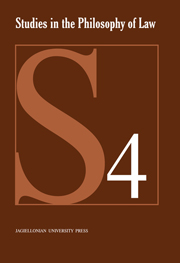Book contents
- Frontmatter
- Contents
- Preface
- Six Causes of the Dispute over Legal Bioethics
- Bioethics and Legal Philosophy
- The Outline of the Subject of Biojurisprudence
- Law and Biotechnology
- The Ethical Significance of Evolution
- Human Nature after Darwin
- The Notion of the Person in Bioethical Debates
- The Roots of Normativity. From Neuroscience to Legal Theory
- Why No One Should Ever Win the Nobel Prize: Neurolaw, Reward and Punishment
- Is There Anybody Who Really Wants to Live Forever? The Significance of Mortality
- The Slippery Slope Arguments Against the Legalization of Physician-Assisted Suicide
- Ethical Problems of Hematopoietic Stem Cells Transplantation
- Notes about the Authors
Human Nature after Darwin
Published online by Cambridge University Press: 05 September 2014
- Frontmatter
- Contents
- Preface
- Six Causes of the Dispute over Legal Bioethics
- Bioethics and Legal Philosophy
- The Outline of the Subject of Biojurisprudence
- Law and Biotechnology
- The Ethical Significance of Evolution
- Human Nature after Darwin
- The Notion of the Person in Bioethical Debates
- The Roots of Normativity. From Neuroscience to Legal Theory
- Why No One Should Ever Win the Nobel Prize: Neurolaw, Reward and Punishment
- Is There Anybody Who Really Wants to Live Forever? The Significance of Mortality
- The Slippery Slope Arguments Against the Legalization of Physician-Assisted Suicide
- Ethical Problems of Hematopoietic Stem Cells Transplantation
- Notes about the Authors
Summary
Introductory remarks
Social scientists have always wanted to believe that the social sciences are ‘true’ sciences, just like the natural sciences. However, such a belief has never been fully justified. The social sciences have usually been descriptive rather than explanatory, and if they tried to be explanatory, the explanatory theories they provided either had a low predictive power or, if they had a high predictive power, predictions generated by these theories rarely passed empirical tests entirely satisfactorily. As a result, the social sciences possess few (if any) theories which can match natural sciences theories in terms of empirical corroboration and universal acceptance. Arguably, this mainly descriptive character of the social sciences has been due to the fact that social scientists have not had at their disposal a solid view of human nature. What is worse, many social scientists have believed that in order to work out such a view, no recourse to the natural sciences is needed. This belief is pernicious for the social sciences: arguably, the social sciences will never reach the status of ‘true’ sciences if they do not become open to developments in the natural (especially, biological) sciences – the only sciences which can provide a solid view of human nature. It should be observed, though, that this belief (which may be dubbed ‘scepticism towards usefulness of biology in the social sciences’ or, less politely, ‘biophobia’) was to some extent justified in the past when the biological sciences did not have very much interesting to say about human beings as social actors.
- Type
- Chapter
- Information
- Studies in the Philosophy of LawLegal Philosophy and the Challenger of Biosciences, pp. 77 - 84Publisher: Jagiellonian University PressPrint publication year: 2010



